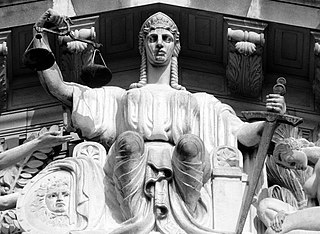In law, standing or locus standi is a condition that a party seeking a legal remedy must show they have, by demonstrating to the court, sufficient connection to and harm from the law or action challenged to support that party's participation in the case. A party has standing in the following situations:
Collateral estoppel (CE), known in modern terminology as issue preclusion, is a common law estoppel doctrine that prevents a person from relitigating an issue. One summary is that, "once a court has decided an issue of fact or law necessary to its judgment, that decision ... preclude[s] relitigation of the issue in a suit on a different cause of action involving a party to the first case". The rationale behind issue preclusion is the prevention of legal harassment and the prevention of overuse or abuse of judicial resources.
A writ of coram nobis is a legal order allowing a court to correct its original judgment upon discovery of a fundamental error that did not appear in the records of the original judgment's proceedings and that would have prevented the judgment from being pronounced. The term coram nobis is Latin for "before us" and the meaning of its full form, quae coram nobis resident, is "which [things] remain in our presence". The writ of coram nobis originated in the courts of common law in the English legal system during the sixteenth century.

Ultra vires is a Latin phrase used in law to describe an act which requires legal authority but is done without it. Its opposite, an act done under proper authority, is intra vires. Acts that are intra vires may equivalently be termed "valid", and those that are ultra vires termed "invalid".

A collateral contract is usually a single term contract, made in consideration of the party for whose benefit the contract operates agreeing to enter into the principal or main contract, which sets out additional terms relating to the same subject matter as the main contract. For example, a collateral contract is formed when one party pays the other party a certain sum for entry into another contract. A collateral contract may be between one of the parties and a third party.

The doctrine of legitimate expectation was first developed in English law as a ground of judicial review in administrative law to protect a procedural or substantive interest when a public authority rescinds from a representation made to a person. It is based on the principles of natural justice and fairness, and seeks to prevent authorities from abusing power.
Australian administrative law defines the extent of the powers and responsibilities held by administrative agencies of Australian governments. It is basically a common law system, with an increasing statutory overlay that has shifted its focus toward codified judicial review and to tribunals with extensive jurisdiction.

Anisminic Ltd v Foreign Compensation Commission [1969] 2 AC 147 is a UK constitutional law case from the House of Lords in English administrative law. It established the "collateral fact doctrine", that any error of law made by a public body will make its decision a nullity and that a statutory exclusion clause does not deprive the courts from their jurisdiction in judicial review unless it expressly states this.
Judicial review is a part of UK constitutional law that enables people to challenge the exercise of power, usually by a public body. A person who contends that an exercise of power is unlawful may apply to the Administrative Court for a decision. If the court finds the decision unlawful it may have it set aside (quashed) and possibly award damages. A court may impose an injunction upon the public body.

United Kingdom administrative law is part of UK constitutional law that is designed through judicial review to hold executive power and public bodies accountable under the law. A person can apply to the High Court to challenge a public body's decision if they have a "sufficient interest", within three months of the grounds of the cause of action becoming known. By contrast, claims against public bodies in tort or contract are usually limited by the Limitation Act 1980 to a period of 6 years.

Administrative law in Singapore is a branch of public law that is concerned with the control of governmental powers as exercised through its various administrative agencies. Administrative law requires administrators – ministers, civil servants and public authorities – to act fairly, reasonably and in accordance with the law. Singapore administrative law is largely based on English administrative law, which the nation inherited at independence in 1965.

Illegality is one of the three broad headings of judicial review of administrative action in Singapore, the others being irrationality and procedural impropriety. To avoid acting illegally, an administrative body or public authority must correctly understand the law regulating its power to act and to make decisions, and give effect to it.

South African property law regulates the "rights of people in or over certain objects or things." It is concerned, in other words, with a person's ability to undertake certain actions with certain kinds of objects in accordance with South African law. Among the formal functions of South African property law is the harmonisation of individual interests in property, the guarantee and protection of individual rights with respect to property, and the control of proprietary relationships between persons, as well as their rights and obligations. The protective clause for property rights in the Constitution of South Africa stipulates those proprietary relationships which qualify for constitutional protection. The most important social function of property law in South Africa is to manage the competing interests of those who acquire property rights and interests. In recent times, restrictions on the use of and trade in private property have been on the rise.

The remedies available in a Singapore constitutional claim are the prerogative orders – quashing, prohibiting and mandatory orders, and the order for review of detention – and the declaration. As the Constitution of the Republic of Singapore is the supreme law of Singapore, the High Court can hold any law enacted by Parliament, subsidiary legislation issued by a minister, or rules derived from the common law, as well as acts and decisions of public authorities, that are inconsistent with the Constitution to be void. Mandatory orders have the effect of directing authorities to take certain actions, prohibiting orders forbid them from acting, and quashing orders invalidate their acts or decisions. An order for review of detention is sought to direct a party responsible for detaining a person to produce the detainee before the High Court so that the legality of the detention can be established.

Exclusion of judicial review has been attempted by the Parliament of Singapore to protect the exercise of executive power. Typically, this has been done though the insertion of finality or total ouster clauses into Acts of Parliament, or by wording powers conferred by Acts on decision-makers subjectively. Finality clauses are generally viewed restrictively by courts in the United Kingdom. The courts there have taken the view that such clauses are, subject to some exceptions, not effective in denying or restricting the extent to which the courts are able to exercise judicial review. In contrast, Singapore cases suggest that ouster clauses cannot prevent the High Court from exercising supervisory jurisdiction over the exercise of executive power where authorities have committed jurisdictional errors of law, but are effective against non-jurisdictional errors of law.

Belmont Park Investments PTY Ltd v BNY Corporate Trustee Services Ltd[2011] UKSC 38, [2012] 1 All ER 505, [2012] 1 AC 383 is a UK insolvency law case, concerning the general principle that parties cannot contract out of the insolvency legislation. The principle has two key aspects, of which the Supreme Court of the United Kingdom ruled that only the first was relevant on the facts of the case:
- The anti-deprivation rule, which is aimed at attempts to withdraw an asset on bankruptcy or liquidation or administration, thereby reducing the value of the insolvent estate to the detriment of creditors.
- The pari passu rule, which reflects the principle that statutory provisions for pro rata distribution may not be excluded by a contract which gives one creditor more than its proper share.
South African administrative law is the branch of public law which regulates the legal relations of public authorities, whether with private individuals and organisations or with other public authorities, or better say, in present-day South Africa, which regulates "the activities of bodies that exercise public powers or perform public functions, irrespective of whether those bodies are public authorities in a strict sense." According to the Constitutional Court, administrative law is "an incident of the separation of powers under which the courts regulate and control the exercise of public power by the other branches of government."

An ouster clause or privative clause is, in countries with common law legal systems, a clause or provision included in a piece of legislation by a legislative body to exclude judicial review of acts and decisions of the executive by stripping the courts of their supervisory judicial function. According to the doctrine of the separation of powers, one of the important functions of the judiciary is to keep the executive in check by ensuring that its acts comply with the law, including, where applicable, the constitution. Ouster clauses prevent courts from carrying out this function, but may be justified on the ground that they preserve the powers of the executive and promote the finality of its acts and decisions.

R v SS for Environment, Transport and the Regions [2001] UKHL 23 is a UK constitutional law case, concerning judicial review.

Huang v Secretary of State for the Home Department [2007] UKHL 11 is a UK constitutional law case, concerning judicial review.












